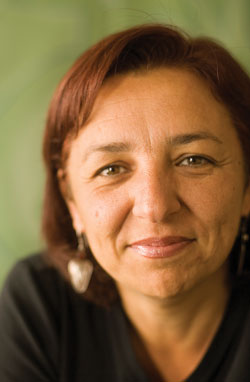As violence and Muslim fundamentalism were transforming Iran in the late 1970s, BOOKDA GHEISAR‘s parents sent her to safety with a neighboring family that was leaving for the United States. Gheisar was 17 when she landed in Logan, Utah, population 20,000. “I had never seen anything like Logan,” says Gheisar, now the 44-year-old executive director of the Social Justice Fund, a philanthropic organization. Compared to the then-cosmopolitan city of her hometown, Tehran, Logan was tiny and fundamentalist in its own way. The Mormon folk of Logan eschewed coffee and soda. All wore matching underwear that reached from the neck to the knees. Knowing nothing about Iran, the kids at school called her “camel jockey” and asked if she knew how to use a fork.
Eventually, Gheisar became a social activist, working for years at nonprofits devoted to issues including sexual assault and health care. As she did so, she began to notice a mismatch between the needs of nonprofits like hers and the resources offered by foundations. Foundations wanted results but were only willing to offer short-term funding. That funding, too, was dedicated for specific projects with demonstrable outcomes, rather than for general operations or the advocacy work that Gheisar believes is necessary for systemic change. A desire to help shape the direction of philanthropy led her, in 2001, to what was then called A Territory Resource (ATR), now the Social Justice Fund. The foundation gives out multiyear grants, encourages advocacy work, and supports fledgling organizations unable to get funding from other foundations because they have no track record. “Just about every progressive group in the Northwest got their first grant from ATR,” Gheisar says. Another crucial difference about the way her foundation operates: Not just big donors, but anyone who gives as little as $240 a year gets to help decide how the foundation’s annual pool of $850,000 should be distributed. Says Gheisar: “The person who gives $240 a year has one vote. The person who gives $24,000 a year has one vote.”—Nina Shapiro www.socialjusticefund.org.








